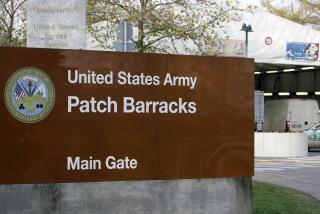Foreign Briefing: Warnings issued for Mideast, Africa and Ebola
- Share via
The U.S. State Department has issued several new warnings — none surprising but all important — as trouble plagues the Middle East and Africa.
Iraq: In an Aug. 10 warning, the agency warns travelers “against all but essential travel to Iraq.”
Saudi Arabia: The Aug. 8 warning asks travelers to “consider the risks of traveling” to Saudi Arabia. It cites a July 4 border crossing attack by Al Qaeda and more threats to Saudi and U.S. interests.
Pakistan: Travelers are asked to defer all nonessential travel in the warning issued Aug. 8.
Nigeria: An Aug. 8 warning tells travelers to stay away from the states of Adamawa, Borno and Yobe and advises travelers to be aware of safety and health issues. Ebola has been reported in Nigeria.
Liberia: On Aug. 7, the State Department warning asks that travelers defer all but nonessential trips to Liberia because of Ebola.
Cameroon: The Aug. 6 warning cites security issues and tells travelers to stay out of the far north, where Boko Haram, a radical Islamist group, has been active. “Twenty-one expatriates have been kidnapped since 2013,” the warning says.
Ebola virus
The national Centers for Disease Control and Prevention says the Ebola virus is present in Liberia, Guinea and Sierra Leone. Unlike the flu, which is dangerous when it is airborne, Ebola is contracted by exposure to “blood or bodily fluids of an infected symptomatic person or through exposure to objects (such as needles),” the website says. You cannot be infected through food or water. There is no cure for the illness, and about half of those who contract it die. The World Health organization, which has declared the outbreak an international health emergency, reports that “in Africa, infection has been documented through the handling of infected chimpanzees, gorillas, fruit bats, monkeys, forest antelope and porcupines.”
Panama Canal
As the Panama Canal prepares to mark its 100th birthday, officials are worried because a drought has decreased the water levels of Gatún and Alajuela lakes and could cause problems for some of the three dozen or more ships that cross the canal each month. October through December is the rainy season, but if moisture is as light as it was last year — November’s rainfall totals were the lowest in a century — problems could occur by the end of this year or early next, Panama Canal Authority chief Jorge Luis Quitano told the Associated Press.
Germany’s ebikes
Electric bikes, or ebikes, which are making cycling tours more accessible for the masses, may be the solution to some of Germany’s freight issues: The Transport Ministry is studying how the bikes could replace freight-hauling trucks. Germany already has more than 1.5 million bikes on the roads and, Bloomberg News reports, has invested about $17.4 million in “ebike sciences and implementation projects through 2016.”
Black Sea concert
Musician and actor Steven Seagal’s blues band performed Aug. 9 in Sevastopol on the Crimean Peninsula, in a concert organized by a motorcycle gang of Russian nationalists known as the Night Wolves. In the spring, Russian President Vladimir Putin, who knows Seagal, moved Crimea into the Russian Federation. Ukraine says the area is still its territory. The concert stage displayed a flag of pro-Russian separatists fighting in eastern Ukraine, Associated Press reported. Seagal’s pro-Russian views got him booted from the lineup of the Estonian Blues Festival, Agence France-Presse reported in the British newspaper the Guardian.
Sources: U.S. State Department, Centers for Disease Control and Prevention, World Health Organization, Associated Press, Bloomberg News, Agence France-Presse, the Guardian
More to Read
Sign up for The Wild
We’ll help you find the best places to hike, bike and run, as well as the perfect silent spots for meditation and yoga.
You may occasionally receive promotional content from the Los Angeles Times.






